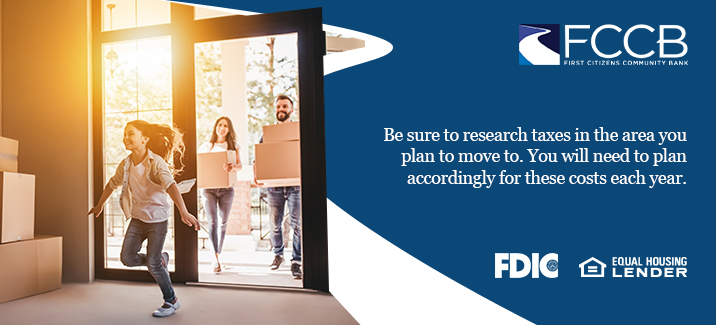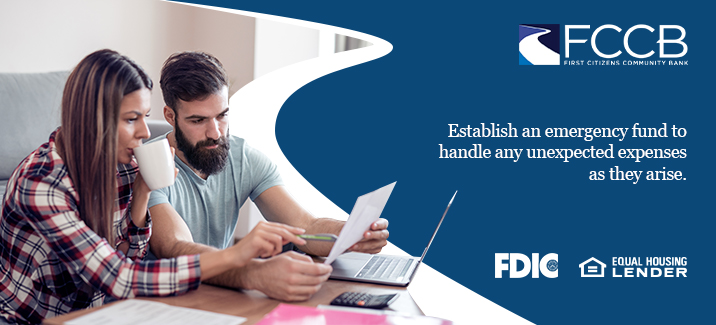12 Additional Costs to Include in Your Homebuying Decision
There’s plenty to look forward to when you’re buying a new home. But with all the excitement of packing moving boxes and planning for new decor, it’s easy to forget about the costs that come along with this process.

You’ve likely already thought about the finances of your mortgage loan application and homeowners insurance, but there are a handful of other costs that you need to factor into your house-buying budget. We’re here to walk you through 12 of the most commonly overlooked costs that you need to be aware of before you sign on the dotted line.
Before You Move In
Property Taxes
At your closing, your settlement agent will likely talk about property taxes that come with owning your new home. These taxes are collected by the local government in your home’s location and will vary based on where you live, the local tax rate, and the value of your new house.
Most of these taxes can be rolled into your monthly mortgage payment and held in an escrow account. Take this into account when you go to apply for a home loan to ensure that you can afford the overall monthly cost.
Closing Costs
Real estate transactions involve a number of different people and a whole range of extra costs. Ask your realtor to explain these to you ahead of time so you can financially prepare. While this isn’t an exhaustive list, here are a few costs that you can expect as part of your home settlement:
- Inspection fees ($300-$500): This is not the same as your house appraisal. An inspection looks at the overall condition of the property so you’re aware of any problems or concerns that you either need to budget for or have the seller take care of ahead of closing. The inspection usually happens after you sign a purchase agreement.
- Legal fees ($750-1250): Some states require a real estate attorney to be involved in the sale process and be present at the settlement.
- Recording costs ($125): This is the fee to register and record your home purchase in public records.
- Appraisal fees ($300-600): Before you close, your loan provider will want an appraisal done of the home to determine the property’s market value.
- Surveyance fee ($200-1000): A survey details your property boundaries and includes any known easements that give others access rights to the property.
- Title search and insurance ($200-1400): The title search is completed to look for any claims, liens, or unpaid taxes against the property. You will also need to have title insurance to cover you against any past claims on the home’s title.
- Mortgage applications ($500): Once you’ve made a final decision, you may need to pay a nonrefundable mortgage application fee to process your paperwork.
- Home warranty ($40-80 per month): A home warranty covers the repair or replacement of major appliances and home systems like HVACs, electrics, water heaters, garbage disposals, washers, and dryers.

School Taxes
Depending on the district that you live in, the amount you pay in school taxes will vary. If you have school-age children, you may not think much of these costs since you want your children to attend well-funded schools. But if you don’t, you may look more closely at the costs that you’re expected to pay each year.
Remember though, even if you don’t have children, having good schools in your neighborhood will increase your property value if you’re thinking about reselling in the future.
Homeowners Association Fees
If the home that you’re looking at is in a development, you’ll likely have to pay monthly or annual fees to the homeowners association. This can range from $100 to thousands of dollars each year, depending on which amenities the HOA covers in your neighborhood.
Moving Costs
The national average moving cost is around $1,400, with a range from $800 to $2,500, for a 2-person moving team within 100 miles. If your family is uprooting and heading across the country, be prepared to pay around $2,200 to $5,700.
Rental trucks can be a good DIY option to make the moving experience more affordable. A truck for local moves shouldn’t cost more than $150 for the day, while long distance can still be into the thousands.
After You Move In
Utilities
Your total cost for utilities each month will depend on your climate, local costs, and the appliances you run. If you’re moving to a bigger home, remember to account for the extra costs of electricity, heating, gas, water, and sewage in your budget. Cable, internet, and garbage or recycling can also become costly very quickly.
Home Maintenance and Repairs
Home maintenance is inevitable in every property, but can be more frequent if you’re buying an older home. Take into account any renovation or repair costs before you close if you want to get started straight away.
If you’re not planning to renovate immediately or want to plan for future unexpected expenses, start saving a little each month in an emergency fund. You never know when a pipe might burst or an appliance fail, so having a little cash set aside for home maintenance can be great peace of mind.

Heating, Ventilation and Air Conditioning
HVAC systems can be expensive to maintain and service depending on where you live. Expect to pay upwards of $150-200 each year for a routine inspection of the system before any necessary repairs or upgrades. Full unit replacements can cost thousands of dollars if you’re working with older systems or aren’t maintaining your current appliances correctly.
Lawn or Tree Care
Almost every home has some type of maintenance requirement for their outside space. Particularly if your home has a large lawn, which can be incredibly timely to effectively maintain. Whether you’re buying lawn mowers or weed eaters yourself, or you’re outsourcing maintenance to a landscaper, be sure to factor in some money for this upkeep in your monthly or annual budget.
Trees can be equally as difficult to maintain, especially if you have a fairly rural or vegetation-dense lot. They grow faster than you might think and will require pruning and other preventative treatments throughout the year. Ask the seller about their current plan before you close to gain any insights and start planning for these costs.
Security System
It’s important that you feel safe in your new home. If your property comes with a hardwired security system, you’ll likely be paying a monthly fee for monitoring if you want to continue using the current service. You could also install your own system like Ring, where you can decide how many rooms you want to cover with cameras or alarms.
Home Tools
As a homeowner, it’s essential that you have at least a few basic tools to hand for any DIY on your new property. If you’re a first-time buyer, asking friends or family for a small toolkit is an excellent house warming gift! But if you want to get serious about doing some renovations yourself, you’ll need to budget for expensive tools to see you through those projects.
Emergency Costs
No matter how old your home is, something will inevitably break (and it’s usually in the middle of the night!). Whether it’s a water pipe, the AC, or even just a lightbulb, you need to have some money set aside to repair or replace whatever is broken. Having an emergency fund can be a big relief when something like this happens.
When you’re ready to move ahead with your next home purchase, the mortgage team at First Citizens Community Bank is here to support you. Contact us today to prequalify or apply for a home loan for free!
Closing costs include a wide range of fees that are paid at the end of a real estate transaction, which could include title fees and legal fees.



